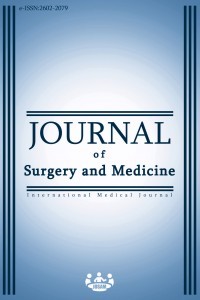Evaluation of the effects of ultrasound-guided infraclavicular nerve block on postoperative pain in pediatric supracondylar fracture surgery
Supracondylar surgery, Infraclavicular nerve block General anesthesia, Ultrasonography, Visual analogue score,
___
- 1. Carson S, Woolridge DP, Colletti J, Kilgore K. Pediatric upper extremity injuries. Pediatr Clin North Am. 2006;53:41–67.
- 2. Bilal B, Boran OF, Sargon MF, Başaran KE, Doğaner A. Electron microscopic examination of needles used in infraclavicular brachial plexus block. J Surg Med. 2020;4(1):5-8.
- 3. Fisher P, Wilson Se, Brown M, Ditunno T. Continuous infraclavicular brachial plexus block in a child. Pediatric Anesthesia. 2006;16:884–6.
- 4. Bricker SR, McLuckie A. Nightingale DA. Gastric aspirates after trauma in children. Anaesthesia. 1989;44:721–4.
- 5. Kretz FJ, Krier C. A child with a full stomach has to be anaesthetized. Anästhesiologie Intensivmedizin Notfallmedizin Schmerztherapie. 2002;37:514–9.
- 6. Klaastad Ø, Smith HJ, Smedby O, Winther-Larssen EH, Brodal P, Breivik H, et al. A novel infraclavicular brachial plexus block: the lateral and sagittal technique, developed by magnetic resonance imaging studies. Anesth Analg. 2004;98(1):252-6.
- 7. Fleischmann E, Marhofer P, Greher M, et al. Brachial plexus anaesthesia in children: lateral infraclavicular vs axillary approach. Paediatr Anaesth. 2003;13:103–8.
- 8. Hadzic A, Arliss J, Kerimoglu B. A comparison of infraclavicular nevre block versus general anesthesia for hand and wrist day case surgeries. Anesthesiology. 2004;101:127-32.
- 9. Aboobacker S, Balakrishnan A, Mahmood SF, Padmanabha S. Effıcacy of contınuous ınfraclavıcular brachıal plexus block ın postoperatıve paın control after upper extremıty orthopaedıc surgery. Journal of Evolution of Medical and Dental Sciences. 2015;99(4):16464-9.
- 10. Tobias, JD. Brachial plexus anaesthesia in children (Review). Paediatric Anaesthesia. 2001;11(3):265-75.
- 11. Hanison J, Ashworth A. Regional anaesthesia: awake or asleep? Br J Hosp Med (Lond). 2011;72:178.
- 12. Marhofer P, Frickey N. Ultrasonographic guidance in pediatric regional anesthesia part 1: theoretical background. Pediatric Anesthesia. 2006;16:1008–18.
- 13. De José BM, Banús E, Navarro Egea M, Serrano S, Perelló M, Mabrok M. Ultrasound‐guided supraclavicular vs infraclavicular brachial plexus blocks in children. Pediatric Anesthesia. 2008;18:838–44.
- Başlangıç: 2017
- Yayıncı: Selçuk BAŞAK
Psychosocial status and attitudes of healthcare workers amid the COVID-19 pandemic
Ercan KURT, İbrahim Ethem OVALİ, Umut GÜLAÇTI, Semih CANPOLAT, Hüseyin KAFADAR, Mehtap KOPARAL, Hakan KAYA, Şeyho Cem YÜCETAŞ
Clinical biomarkers to predict preoperative lymph node metastasis in endometrial cancer
H. Öztürk ŞAHİN, Alpay YILMAZ, Duygu SIDDIKOĞLU
Meltem SERTBAŞ, Serkan ELARSLAN, Emre ŞENOCAK
Seda SERTEL MEYVACI, Mustafa HIZAL, Handan ANKARALI
The effect of preprocedural serum albumin to fibrinogen ratio on arteriovenous fistula maturation
Views of Turkish healthcare professionals and their hesitations about the COVID-19 vaccine
Sadik KÜKRER, Ayfer PEPEKAL KÜKRER, Sefa ARLIER, Simten GENÇ
Türk popülasyonunda glutatyon S-transferaz A1 rs3957357 polimorfizm sıklıkları
